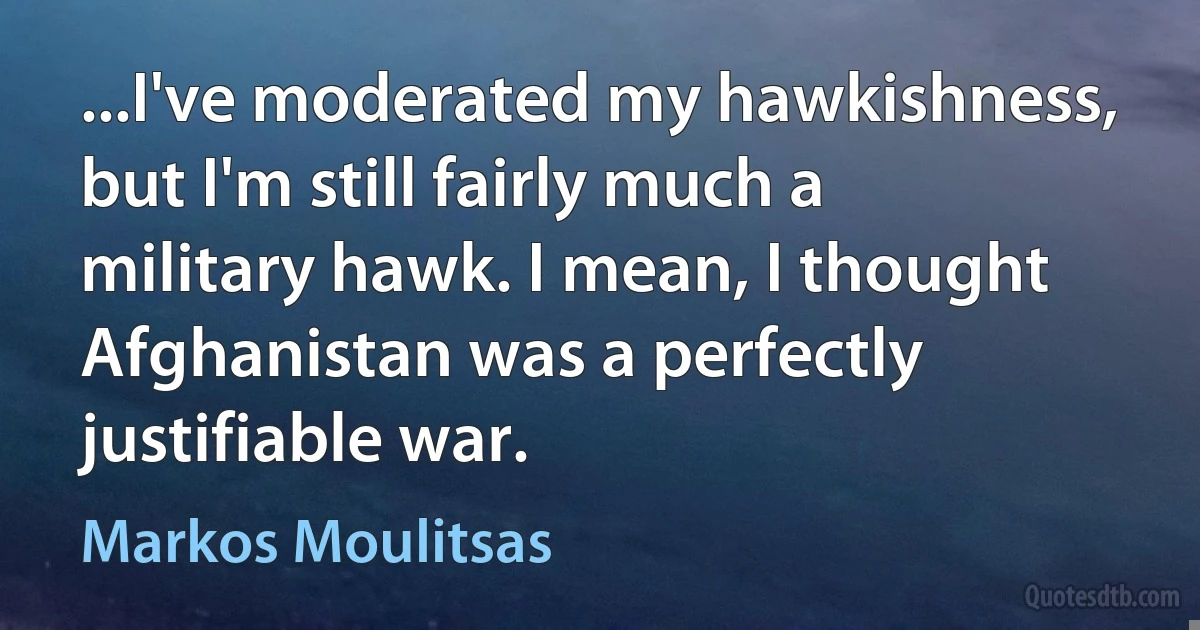Hawk Quotes - page 3
Nigel Barton (On TV): I feel I don't belong here, that's my trouble.
Interviewer (on TV): Well, where do you belong? At home?
Harry Barton: Of course!
Nigel Barton (on TV): No, I'm afraid I don't. Now it hurts to say this, of course, but it's the truth. Back at home, in the village, in the workingmen's club, with people I went to school with, I'm so much on the defensive, you see. They suspect me of making qualitative judgments about their environment, you understand, but it's not that I wish to do so. Yet I even find my own father looking at me oddly some times, waiting to pounce on some remark, some expression in my face, watching me like a hawk. I don't feel at home in either place. I don't belong. It's a tightrope between two different worlds, and I'm walking it.
Harry Barton: You're a bloody liar, Nigel!

Dennis Potter
Dying was nothing and he had no picture of it nor fear of it in his mind. But living was a field of grain blowing in the wind on the side of a hill. Living was a hawk in the sky. Living was an earthen jar of water in the dust of the threshing with the grain flailed out and the chaff blowing. Living was a horse between your legs and a carbine under one leg and a hill and a valley and a stream with trees along it and the far side of the valley and the hills beyond.

Ernest Hemingway
By his machines man can dive and remain under water like a shark can fly like a hawk in the air can see atoms like a gnat can see the system of the universe of Uriel, the angel of the sun can carry whatever loads a ton of coal can lift can knock down cities with his fist of gunpowder can recover the history of his race by the medals which the deluge, and every creature, civil or savage or brute, has involuntarily dropped of its existence and divine the future possibility of the planet and its inhabitants by his perception of laws of nature.

Ralph Waldo Emerson
What's evil for the hawk is the mouse because, you know, the mouse is quick and gets away but I did this one realization every scientist goes through at one point... if you gave the hawk power, the power of God, the first thing the hawk might do is to slow down the mouse. But then the hawk would lose it's speed. And then if you slow the mouse all the way down, so it can just barely move, the hawk would lose its flight. So that in a weird way the tension between those two say natural enemies is what gives birth to their beauty. So I definitely feel that the tension we have right now within the human community in particular - that those are ultimately going to be resolved with a deeper harmony and a deeper appreciation for one another.

Brian Swimme
Then came the Black Hawk war; and I was elected a captain of volunteers, a success which gave me more pleasure than any I have had since. I went the campaign, was elated, ran for the legislature the same year (1832), and was beaten - the only time I ever have been beaten by the people.

Abraham Lincoln
McCain would give illegal aliens citizenship. He mocks a U.S. president's oath to protect border security, calling the vast majority of Americans who oppose amnesty "vigilantes" and "bigots." Last week, McCain, often booed, termed himself "a fellow conservative" at D.C.'s annual Conservative Political Action Conference. He is surely a foreign-policy hawk, even arguably an economic conservative. To win, though, McCain needs the GOP's much larger social/cultural constituency. How does he woo those who disbelieve, even loathe, him? Mistrusting McCain's words, many Republicans will respond only to acts: i.e. the vice presidency. Enter Mike Huckabee, coming from nowhere to take eight primaries and caucuses and embody the Middle America that frets about the mortgage, college education, a society that perverts right v. wrong.

John McCain
In 1993 in Mogadishu, Somalia, I was the Delta Force commander during the events most commonly referred to as "Black Hawk Down." Two Black Hawk helicopters were shot down in the city of five million people, where most of those people were starving refugees. Within thirty minutes of the first chopper being shot down, the second one was shot down. When the first chopper went down I sent every one of my soldiers who were already fighting in the city to go rescue the crew and passengers of the first crash. I was left with few options when the second helo went down over a mile away from the first crash. I had to pull together a second rescue effort using those soldiers, sailors, and airmen who were left in the base- many of whom were not combat arms specialties (they were clerks, mechanics, communicators, and supply people). To their credit, every man was eager to be part of the effort to rescue their brothers at the second crash site.

William G. Boykin


